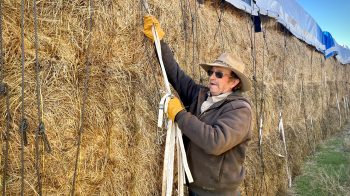Organic work aids fertilizer-free crops
TEXT OF STORY
Steve Chiotakis: Chinese farmers got a scolding in Copenhagen. At the climate talks there, they were told they’re using too much polluting fertilizer. Many African farmers have the opposite problem — not enough fertilizer to grow food. But some farmers in Rwanda are learning organic techniques instead. Marketplace’s Gregory Warner has more.
Gregory Warner: Thadee Munyamana is a farmer in the poorest part of Rwanda, the central district of Nyamata. In 30 years tilling his land, he’s never grown enough to feed his own family. The problem is the soil — it’s dry and sandy, and he can’t afford fertilizer to improve it.
But this year, Thadee grew a lot more. He even has surplus vegetables to sell.
Thadee Munyamana: I have vegetables that I used to go and buy from the market. But now instead, my neighbors come and buy from me.
Josh Ruxin is director of the Millenium Villages project in Rwanda. He’s helped Thadee learn organic methods, like using composts and cow manure to boost the soil. Really basic stuff.
Josh Ruxin: Check it out.
Warner: What’s going on here?
Ruxin: This is, you use it for irrigation.
Ruxin shows me some recycled water bottles shoved upside down in the soil.
Ruxin: And it works great, costs nothing. Highly effective.
He says that teaching farmers to go green isn’t only better for the environment, it’s cheaper than handing out fertilizer.
Ruxin: If they can even track down the fertilizer. There’s been such a run on fertilizer that one of the last places in the world that the fertilizer’s gonna reach is the relatively small market of Rwanda.
He takes me to the local market in Nyamata, where food prices have almost doubled from last season. Local farmers he says are poised to take advantage of this. They don’t have the growing transportation costs of international growers.
Ruxin: The farmers around Nymata have got an opportunity today that they’ve not seen certainly in their lifetimes. That opportunity is really to get a fair price for their food in the market.
To hold onto that opportunity for the long haul, Ruxin’s farmers will need a lot more help — with bank loans and government subsidies — to keep people buying local. Meanwhile, farmer Thadee Munyamana hopes at least to earn enough to send his kids to school. And off the farm for good.
In Nyamata, Rwanda, I’m Gregory Warner for Marketplace.
There’s a lot happening in the world. Through it all, Marketplace is here for you.
You rely on Marketplace to break down the world’s events and tell you how it affects you in a fact-based, approachable way. We rely on your financial support to keep making that possible.
Your donation today powers the independent journalism that you rely on. For just $5/month, you can help sustain Marketplace so we can keep reporting on the things that matter to you.


















